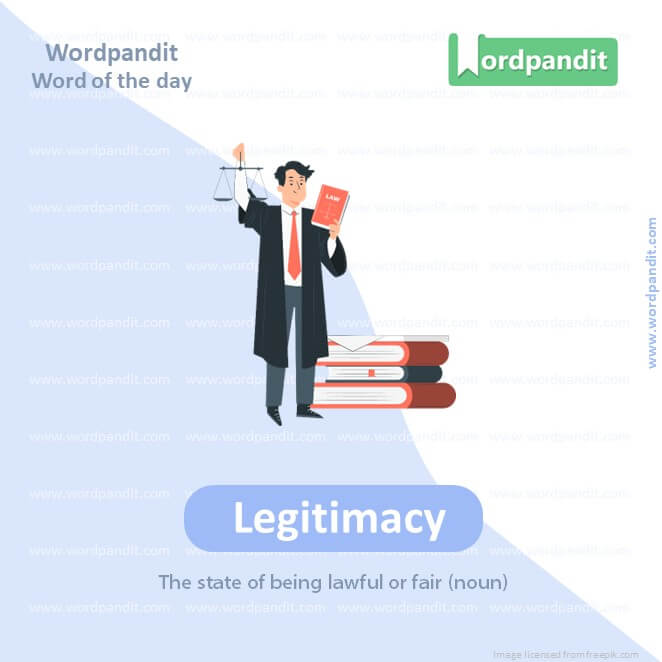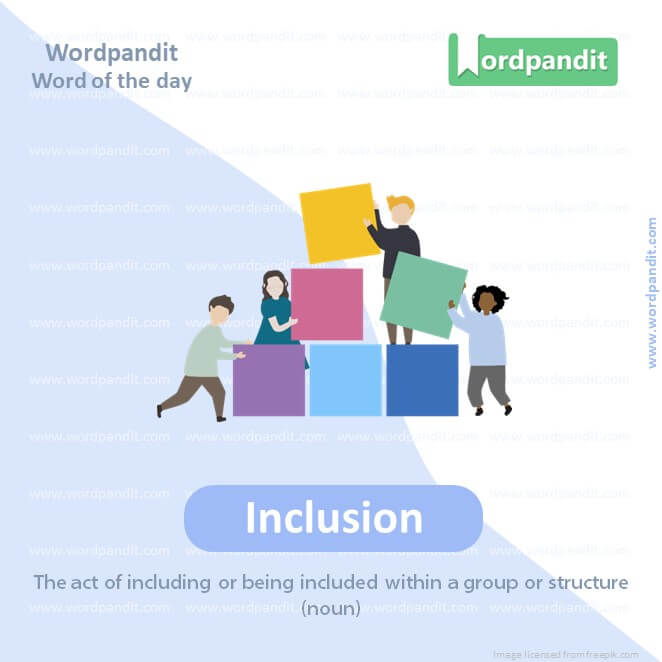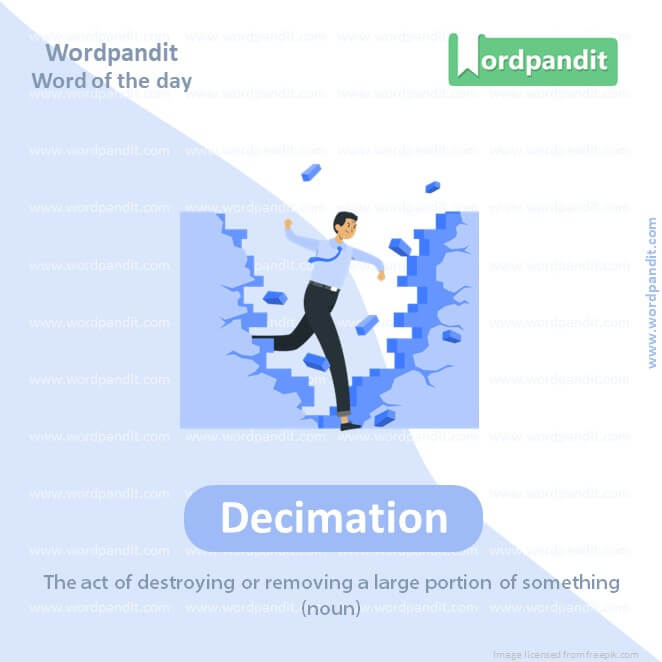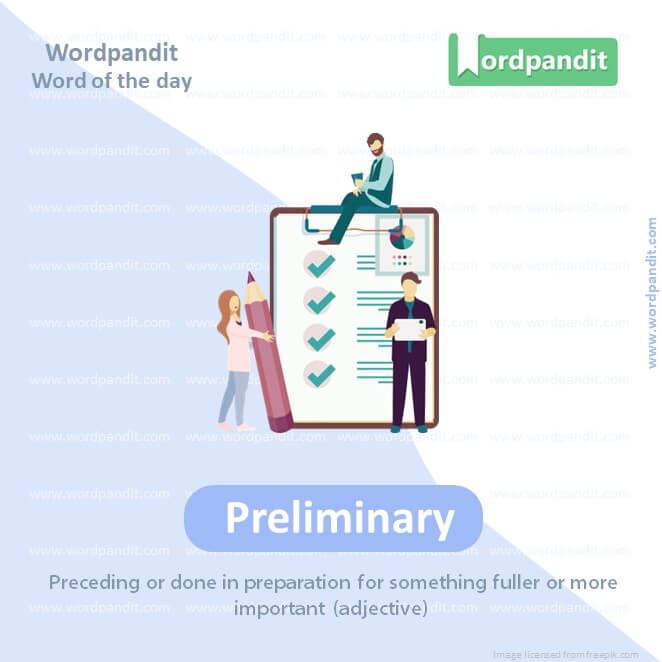Daily Vocabulary Words: List of Daily Used Words
Hi there. Welcome to this special section @ Wordpandit.
Our endeavour here is straightforward: highlighting important daily vocabulary words, you would encounter in The Hindu. This is your repository of commonly used words; essentially, we are posting a list of daily used words. Hence, this has significant practical application as it teaches you words that are commonly used in a leading publication such as The Hindu.
Visit the website daily to learn words from The Hindu.

WORD-1: Legitimacy
CONTEXT: What they are striking at is the legitimacy of the liberal, democratic process in which elections lead to certain winners.
SOURCE: The Hindu
EXPLANATORY PARAGRAPH: Legitimacy is like when someone has the right to do something or be in charge, and everyone thinks it’s fair and correct. For example, when a teacher is in charge of a class, it’s legitimate because they are supposed to be the teacher.
MEANING: The state of being lawful or fair (noun).
PRONUNCIATION: luh-jit-uh-muh-see
SYNONYMS: Validity, Authenticity, Legality, Rightfulness, Justification
USAGE EXAMPLES:
1. The election’s legitimacy was questioned due to voting irregularities.
2. She challenged the legitimacy of the new law.
3. His claim to the throne had little legitimacy.
4. The legitimacy of her argument was undeniable.

WORD-2: Exerting
CONTEXT: Left-wing populists would argue that the masses, the general public, the working class were not being allowed to influence public policy because the rich, the political elites, dominated by capitalist interests, were exerting undue influence on the system.
SOURCE: The Hindu
EXPLANATORY PARAGRAPH: Exerting is like using all your strength or effort to do something. Imagine trying to push a heavy sofa across the room; you’re exerting yourself to move it.
MEANING: Applying or using force, effort, or influence (verb).
PRONUNCIATION: ig-zur-ting
SYNONYMS: Applying, Utilizing, Exercising, Deploying, Wielding
USAGE EXAMPLES:
1. He was exerting a lot of energy to lift the heavy boxes.
2. The company is exerting pressure on its competitors.
3. She’s exerting her influence to get the project approved.
4. The team exerted themselves to win the game.

WORD-3: Inclusion
CONTEXT: But the right-wing version in the world now also asks a powerful question, which is whether the liberal, democratic project of inclusion is legitimate.
SOURCE: The Hindu
EXPLANATORY PARAGRAPH: Inclusion means making sure everyone is included or a part of something. It’s like inviting every kid in your class to your birthday party so no one feels left out.
MEANING: The act of including or being included within a group or structure (noun).
PRONUNCIATION: in-kloo-zhuhn
SYNONYMS: Incorporation, Integration, Involvement, Participation, Inclusion
USAGE EXAMPLES:
1. The new policy promotes inclusion in the workplace.
2. Inclusion in the team made her feel valued.
3. The program is designed for the inclusion of all students.
4. Her inclusion in the list of nominees was unexpected.

WORD-4: Decimation
CONTEXT: In Pacific Affairs, I argue with Seyed Hossein Zarhani that there has been a systematic decimation of public institutions in three ways: one, by interpreting rules differently; two, by changing rules incrementally, such as by bringing in a Bill (in India) regulating the appointment of the Chief Election Commissioner
SOURCE: The Hindu
EXPLANATORY PARAGRAPH: Decimation is like when a lot of things are destroyed or removed, leaving only a few behind. It’s as if ten toys were on the table, and nine were taken away, leaving just one.
MEANING: The act of destroying or removing a large portion of something (noun).
PRONUNCIATION: des-uh-may-shuhn
SYNONYMS: Destruction, Devastation, Annihilation, Slaughter, Ruination
USAGE EXAMPLES:
1. The disease led to the decimation of the population.
2. The hurricane caused the decimation of the coastal area.
3. Economic crisis led to the decimation of jobs in the industry.
4. The army’s defeat was near decimation.
WORD-5: Austerity
CONTEXT: the powerful appeal is of a country whose economic crisis has been so long-standing that is allows someone like Mr. Milei to come and say, everyone has let you down and 40 years of austerity measures periodically by the International Monetary Fund have made your lives terrible.
SOURCE: The Hindu
EXPLANATORY PARAGRAPH: Austerity is like when you have to be very careful with your things or money, using them only for what’s really necessary. It’s like saving your allowance instead of buying toys.
MEANING: Sternness or severity in manner or attitude; also, extreme plainness and simplicity in style or appearance (noun).
PRONUNCIATION: aw-stair-uh-tee
SYNONYMS: Severity, Strictness, Frugality, Simplicity, Asceticism
USAGE EXAMPLES:
1. The government’s austerity measures were unpopular.
2. She lived a life of austerity and simplicity.
3. Austerity in the budget meant cutting back on expenses.
4. The room’s austerity was evident in its lack of decoration.

WORD-6: Preliminary
CONTEXT: Our preliminary research suggests that you need three things: a narrative of being a strong democratic leader; a clear message of being secular and not ethno-nationalistic; and perhaps attending to welfare goals.
SOURCE: The Hindu
EXPLANATORY PARAGRAPH: Preliminary is like something that comes first, before the main event. It’s like having a small quiz before a big exam to get ready for it.
MEANING: Preceding or done in preparation for something fuller or more important (adjective).
PRONUNCIATION: pre-lim-in-air-ee
SYNONYMS: Initial, Introductory, Preparatory, Preliminary, Provisional
USAGE EXAMPLES:
1. The preliminary results of the study were promising.
2. They had a preliminary meeting before the main conference.
3. The athletes competed in the preliminary rounds.
4. Preliminary discussions were held before the agreement.
WORD-7: Presentist
CONTEXT: One of the dangers of any political commentary is that we have a presentist bias.
SOURCE: The Hindu
EXPLANATORY PARAGRAPH: Presentist is when someone thinks or talks about the past as if it were like today. It’s like saying people in olden times should have had smartphones, which they didn’t.
MEANING: An attitude toward the past dominated by present-day attitudes and experiences (noun).
PRONUNCIATION: pre-zen-tist
SYNONYMS: Contemporary, Modernist, Current-day, Today’s, Recent
USAGE EXAMPLES:
1. His presentist view of history ignores the context of that era.
2. The historian was criticized for her presentist interpretation.
3. Avoiding a presentist perspective is important in historical analysis.
4. The article showed a presentist bias in judging historical events.
WORD-8: Authoritarianism
CONTEXT: In the 1970s, Latin America saw a collapse of democratic systems and the rise of bureaucratic authoritarianism.
SOURCE: The Hindu
EXPLANATORY PARAGRAPH: Authoritarianism is like when someone in charge wants to make all the decisions without listening to others. It’s like a teacher who doesn’t let anyone talk or give ideas.
MEANING: The enforcement or advocacy of strict obedience to authority at the expense of personal freedom (noun).
PRONUNCIATION: aw-thor-ih-tair-ee-uh-niz-um
SYNONYMS: Dictatorship, Totalitarianism, Tyranny, Autocracy, Despotism
USAGE EXAMPLES:
1. The country suffered under the rule of authoritarianism.
2. Authoritarianism in the organization stifled creativity.
3. The leader’s authoritarianism was opposed by many.
4. His style of management was criticized for its authoritarianism.
WORD-9: Volatility
CONTEXT: In 2008, Pradeep Chhibber and I found that Indian States that have less fiscal space experienced higher electoral volatility and higher rates of anti-incumbency.
SOURCE: The Hindu
EXPLANATORY PARAGRAPH: Volatility is like when things can change very quickly and unpredictably. It’s like the weather being sunny one minute and rainy the next.
MEANING: The quality of being subject to frequent, rapid, and significant change or unpredictability (noun).
PRONUNCIATION: vol-uh-til-uh-tee
SYNONYMS: Unpredictability, Changeability, Instability, Inconsistency, Fluctuation
USAGE EXAMPLES:
1. The stock market is known for its volatility.
2. The political volatility in the region is worrisome.
3. Economic volatility affects global markets.
4. The volatility of his mood made him unpredictable.
WORD-10 Antiquity
CONTEXT. the Yangtze is modern China’s lifeline while retaining its antiquity.
SOURCE: The Hindu
EXPLANATORY PARAGRAPH: Antiquity is like things that are very, very old, like castles or old coins. It’s like something from a long time ago, even before your grandparents were born.
MEANING: The ancient past, especially the period before the Middle Ages (noun).
PRONUNCIATION: an-tik-wuh-tee
SYNONYMS: Ancient times, Olden days, Classical period, Early history, Bygone era
USAGE EXAMPLES:
1. The museum’s collection of antiquity is impressive.
2. She has a deep interest in the art of antiquity.
3. The ruins are a testament to the engineering skills of antiquity.
4. His study focuses on the philosophies of antiquity.
Vocabulary Words with Meaning
Penetrating the rich tapestry of language, the essence of ‘vocabulary words with meaning’ is a crucial aspect. It’s these seeds of knowledge that bud into fluent conversations and comprehensive understanding. The knack of grasping ‘vocabulary words with meaning’ is pivotal in language learning, but it demands a nuanced approach and strategy.
Learning ‘vocabulary words with meaning’ isn’t about mechanically memorizing heaps of words. It’s about building connections and creating a profound understanding of these words. A promising approach to assimilate ‘vocabulary words with meaning’ involves utilizing a wide range of resources including literature, films, music, and digital content. This immersion provides a broad context and diverse settings for these words, simplifying their comprehension and use.
When you’re focusing on ‘vocabulary words with meaning’, remember to incorporate memory-enhancing techniques into your learning regimen. Tools like flashcards or recall-based applications can aid significantly in long-term retention of these words. Additionally, mnemonic strategies, associating words with distinctive images or stories enhance memory recall and understanding.
The journey of mastering ‘vocabulary words with meaning’ also benefits greatly from practice and application. Engage in conversations using the language, express your thoughts in writing, and try to incorporate newly learned words into your routine. This not only enhances your familiarity with the words but also aids in an intimate understanding of their connotations and denotations.
To sum up, learning ‘vocabulary words with meaning’ is akin to assembling a jigsaw puzzle: it requires patience, strategy, and persistence. But the picture that finally emerges is a beautiful tapestry of language – vivid, articulate, and expressive. So, set your sails toward the voyage of ‘vocabulary words with meaning’, and discover the joy of speaking and understanding a language with finesse.













